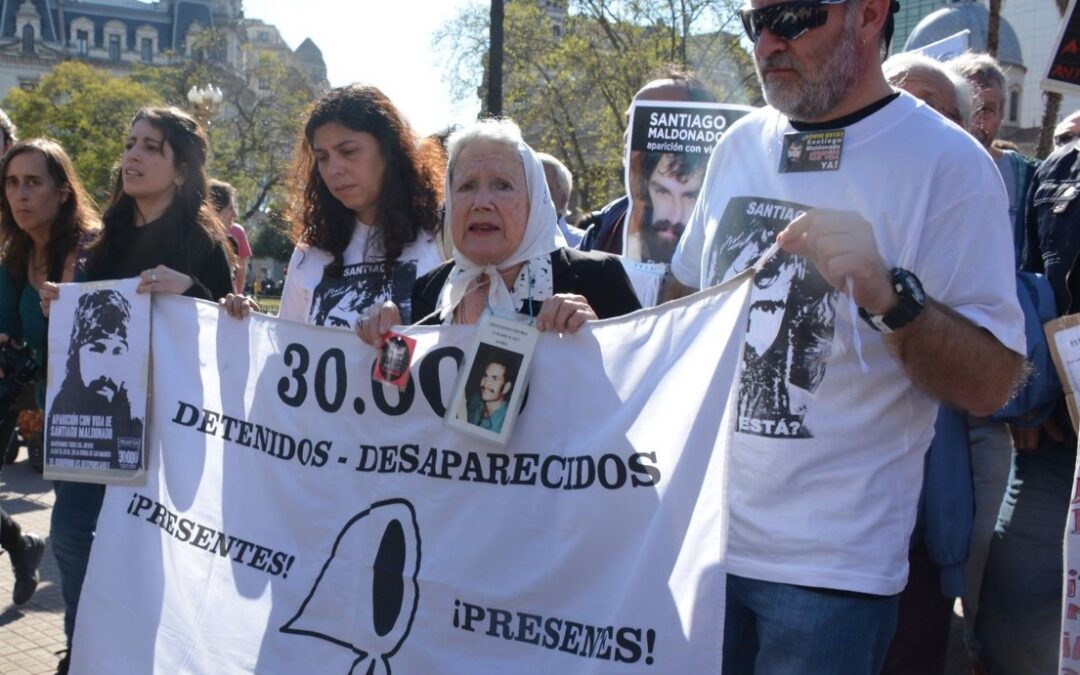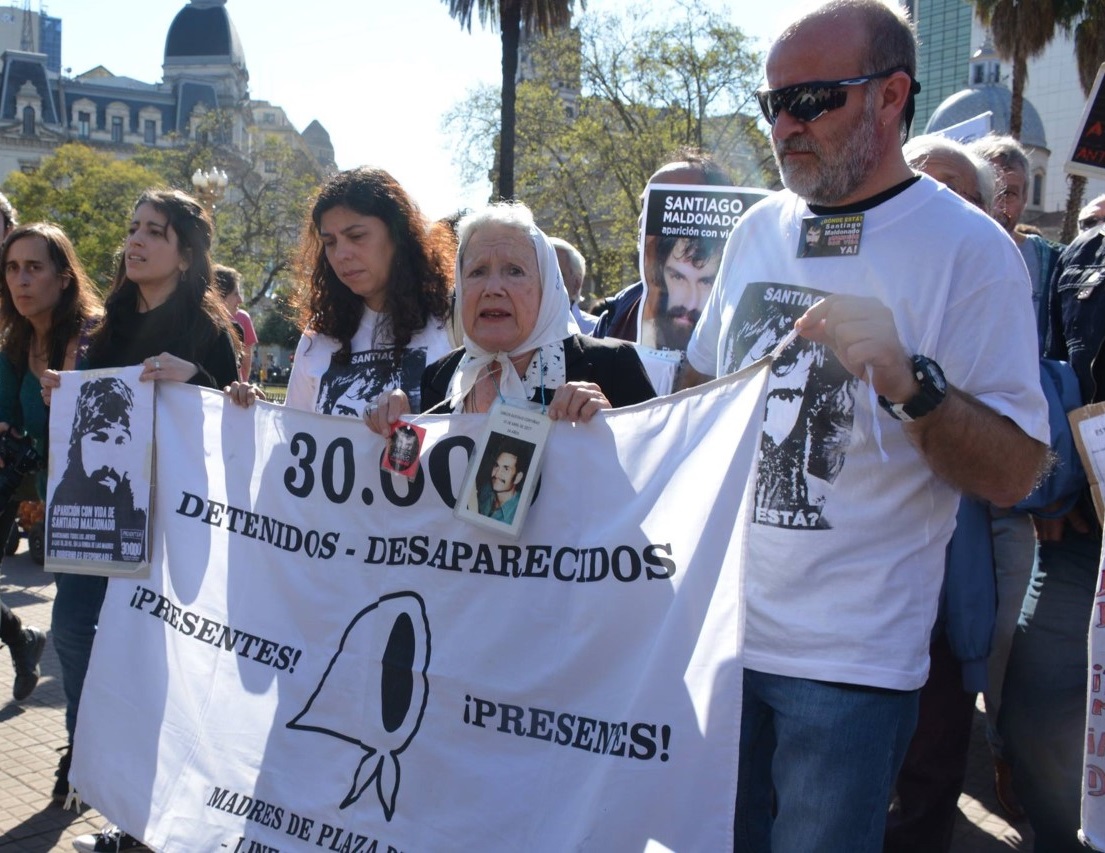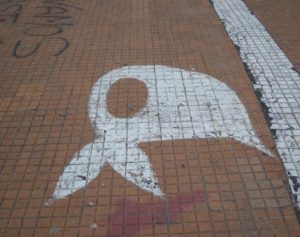by Carla Torres and Daniel Ozarow
The enforced disappearance of up to 30,000 citizens during Argentina’s last military dictatorship is world renowned. Having ruled the country between 1976 and 1983, the Military Junta was forced to call elections following a disastrous military performance in the Malvinas War of 1982 and a deepening economic crisis. Thus, the country recovered its democracy in 1983 after almost a century of successive civic-military governments and intermittent periods of democratic rule. In the immediate aftermath of the dictatorship, it seemed that Argentina would be recognised as a leading country in the region for its human rights and memory policies dealing with its traumatic past. Since 1983, however, the ways in which its successive democratic governments have engaged with its military past have varied tremendously. Within this changing political context, activists such as Nora Cortiñas, Co-Founder of Mothers of the Plaza de Mayo, have provided a consistent, and powerful, alternative voice.
Human Rights and Memory Politics in the Immediate Post-Dictatorship Period:
Argentina has a back and forth story with its recent past. In 1983 former President Raúl Alfonsín established the National Commission on the Disappearance of Persons (CONADEP) to produce a report on the enforced disappearances that took place during the last dictatorship. The Commission produced the damning but famous Never Again (Nunca más) report in 1984. Arguably more important was the Trial of the Juntas itself, the first time that a democratic government in Latin America had tried their military predecessors for crimes committed during their period of rule. However, concerned about the possibility of a military backlash following a series of mutinies and rebellions, Alfonsín passed new legislation that effectively ended investigations into the Junta. The Law of Due Obedience (1987) specified that lower-ranked members of the military could not be brought to court if they were following the orders of their superiors, while the Full Stop Law (1986) marked a date beyond which new trials could not be brought to court. Thus, only those deemed “most responsible” were to be put on trial. Many of those who had committed abduction and torture were therefore free to participate in ordinary day-to-day life in Argentina, as if nothing had happened.
During the 1990s, former President Carlos Menem attempted to promote a top-down policy of “reconciliation” despite the lack of popular support for such an initiative. In 1989 Menem exonerated military officers that were still on trial for the crimes they had committed and, in December 1990, he pardoned ex-commanders from the Military Junta. He also implemented a neoliberal economic programme that, in time, would weaken the Argentine economy and ultimately provoke the debt default and economic crisis of 2001.
Economic Policy and Crisis in Argentina:
On the 19th and 20th December 2001, following the election of president Fernando De La Rua, huge popular uprisings took place on the streets of Buenos Aires and throughout the country’s urban centres. The uprisings against De La Rua’s government were in response to the catastrophic economic crisis which it had failed to contain. More broadly the protests targeted the political class and the neoliberal system itself. However, this neoliberal economic paradigm which was the target of the uprising can also be linked back to the most recent dictatorship. Indeed, it was the Military Junta that had established the neoliberal economic reforms which were subsequently deepened during Menem’s regime (1989-1999) and by his successor, De La Rua (1999-2001). By December 2001, the country was in its third year of economic recession and while people (including the Mothers of the Plaza de Mayo) were on the streets, the government authorised the military and police forces to repress the nationwide popular protests, resulting in the deaths of 39 Argentinians.
A new economic direction for the country, the ‘debt reduction policy’, was subsequently pursued by the governments of Néstor Kirchner (2003-7) and Cristina Fernández de Kirchner (2008-15). Between 2005 and 2010, Argentina carried out debt restructures that wrote down two thirds of its debt, although the country also paid huge amounts to settle debts with the Paris Club, IMF, and the World Bank’s investor settlement process. Having partly renationalised the oil industry in 2012, payments were also made to Repsol, the Spanish oil giant. The government of Cristina Fernández de Kirchner also approved the “Sovereign Payment and Public Debt Restructuring Law” in 2014. Nonetheless, these measures failed to bring about a full audit of the debt which has odious origins in the dictatorship period when external debt was accumulated from the International Monetary Fund and other sources in order to finance the dictatorship and, along with it, the thousands of crimes against humanity that it committed. In the Olmos Cause judgement (2000), the debt’s origins were confirmed by Judge Ballestero who also declared that a significant part of it was illegitimate – since it had accumulated though hundreds of separate fraudulent acts – and therefore shouldn’t have to be honoured.
Yet the nation’s economic policy radically altered course once more following the 2015 election of current president, Mauricio Macri. His administration has been preaching similar economic recipes to those that already failed to perform during the dictatorship and subsequent presidencies of Carlos Menem and Fernando de La Rua. In addition to a general neoliberal adjustment of the Argentine economy, the Macri government forged an agreement with its outstanding foreign creditors (US vulture funds) who had refused to engage in the restructuring processes and subsequently held the country to ransom by suing them in the international courts. They were eventually handsomely paid off by Macri’s administration, depriving the country of billions of dollars which could have been spent on its people. Due to this capital flight and other policies, his government has also accumulated record debt levels (US $42 billion last year alone), famously recently releasing 100-year bonds and having become the emerging economy with the highest indebtedness in the world according to Bloomberg. These changes in economic policy have also altered the nation’s foreign policy. While the Latin American Pink Tide governments, China and Russia were allies to Argentina during the Kirchner administrations, Marci’s ‘Cambiemos’ government has transformed the foreign policy agenda once again, in an attempt to “return to the world”. Argentina hosted the World Economic Forum during a massive strike in Buenos Aires last April and, with the blessing once again of the International Monetary Fund, will host the next summit of the World Trade Organization in December. These events are the consequence of a very particular agenda during a year that has also included meetings with former United States President Barack Obama as well as the current US Vice President.
The Entanglement of Economic and Human Rights Policies:
Although it may not be immediately apparent, these economic shifts are closely paralleled in changing attitudes towards official memory policy in Argentina. Although the Full Stop Law and Law of Due Obedience were declared unconstitutional prior to his election, it was while Néstor Kirchner began to pursue his government’s ‘debt reduction policy’ that a new form of memory politics were created and incorporated directly into official state policy. New archives, cultural centres and historical memory sites were created among many other initiatives. Moreover, his government oversaw the recommencement of trials for crimes against humanity in 2006. Similar policies were subsequently pursued by Cristina Fernández de Kirchner. Concurrent with Macri’s radical alterations in the economic field, it appears that, under his government, memory politics may also revert back to those of the 1980s and 1990s. At times, it appears that the state barely recognises the victims of the dictatorship at all. Indeed, Macri has even publically questioned the number of victims defined by human rights organizations, and the state seeks to downplay the gravity of the atrocities that were committed by the military government. More sinister still is that a new case of enforced disappearance took place on 1st of August 2017. A 28-year-old man, Santiago Maldonado, went missing after the gendarmerie (federal security forces) broke up an indigenous community’s protest over their disputed ancestral lands (currently legally owned by fashion brand Benetton) in Pu Lof Cushamen, Patagonia. The Mapuches were protesting for lands rights and the liberation of their leader, Facundo Jones Huala, when security forces violently repressed the protest. Several witnesses claim that they saw security agents beating up a man and forcing someone into a van; it is suspected that this was Santiago. Maldonado’s body has since been discovered, 78 days later, and the official autopsy is currently being conducted. Macri’s administration is relying on the initial but inconclusive outcomes of the autopsy to dismiss the notion of ‘enforced disappearance committed by military police agents’. However, it remains the lead hypothesis for many and one which Macri’s own minister, Claudio Avruj, has had to concede. The case has caused a major political crisis for Marci’s government, which took over a month to recognise the misconduct of the police force and still fails to condemn outright the repression of the indigenous community.
Despite these causes for serious concern, however, there are some brave voices that continue to resist and confront the repression, increasing public debt and savage attacks on labour and human rights, which accompany the neoliberal and increasingly authoritarian model that Argentina has witnessed so many times in the past and is experiencing once more. For forty years, which is to say throughout all the events described above, Nora Cortiñas – one of the most respected and committed human rights leaders in the world – has been a consistent voice speaking out against these elements of continuity between the dictatorship, Menem and Macri governments.
Nora Cortiñas – a Life in Protest:
Nora Cortiñas was born in Buenos Aires, Argentina in 1930. Her son, Carlos Gustavo Cortiñas belonged to the Peronist Party and worked for the National Institute of Statistics and Census of Argentina. He was abducted and disappeared by the armed forces in 1977. For Nora, this was a turning point. From being a housewife, she became one of the most recognised leaders in the global human rights movement. Since then, Nora has devoted herself to campaigning for human rights causes, especially those concerning state-committed crimes against humanity and enforced disappearances in Argentina and beyond.
Since Carlos’ disappearance, Nora has travelled a long journey in the pursuit of justice and truth for her son. But of course, she wasn’t alone. The formation of Mothers of the Plaza de Mayo (Madres de Plaza de Mayo), one of the most important moments for human rights organisations in Argentina, brought together thousands of mothers who were also searching for their children. It is a contemporary example not only of justice- and truth-seeking, but also of women’s empowerment and the notion that political struggles are a collective, rather than individual task. Women who had suffered the abduction of their children confronted the military dictatorship in the centre of public space, the historic Plaza de Mayo in Buenos Aires, which faces the Presidential Palace where first Rafael Videla, then Roberto Viola, Leopoldo Galtieri and finally Reynaldo Bignone, commanded the abduction, torture and enforced disappearance of political opposition at that time.
The Mothers were born on 30th April of 1977, after gathering in the Plaza de Mayo to protest the Military Junta. They were reprimanded by the officers who demanded that they move along. The mothers took this order literally and, in an act of civil disobedience, they moved, but in circles around the square and thus gave birth to their iconic march that continues to take place every Thursday afternoon in the Plaza de Mayo some four decades later. The Mothers later split into two groups due to ideological differences – the Founding Line and the Association. Nora Cortiñas belongs to the former.
Argentina – Current Challenges and the Shadow of the Dirty War:
Forty years have passed since Nora Cortiñas first chose to dedicate her life to the search for justice. As we have seen, even now, thirty-four years since the return to democracy, the country and the region still have many unresolved issues regarding external debt, the economy and security that have been inherited from previous military governments. It is for these reasons that Nora’s struggle continues.
In an interview with the political party Project South, in 2010, she commented that “To me, the external debt is something that I have always remembered. I link this to the 30.000 disappeared Argentinians, with my son Carlos and with the people that must pay a debt that wasn’t assumed by them (…) and which began with the last civic-military dictatorship (…) The debt was increased enormously by the Military Junta through torture, abduction and death.”
Nora’s hypothesis proposes that no neoliberal economic programme can be delivered without a systematic repression of the people against whose interests it acts. For this reason, she continues to take up her son’s struggle and resist the current implementation of neoliberal economic policies. In this scenario, President Mauricio Macri stated the need to cut the country’s labour costs in the hope of increasing foreign investment, which led to enormous mobilisations by workers and to a general strike in April this year. Despite economic stagnation, an almost doubling in the cost of living, a 1.5 million increase in poverty, record indebtedness, rising unemployment and human rights violations which have been condemned by the United Nations, Amnesty International and others, Macri and Cambiemos won the legislative elections last weekend in convincing fashion. A further assault on the labour movement, a deepening of the neoliberal model and greater misery for the vast majority of the population looks set to follow if the removal of state subsidies and a 10% increase in petrol prices just hours after the election is anything to go by.
As regards the case of Santiago Maldonado, here too Nora has been actively involved. Sergio Maldonado (Santiago’s brother) led the search for his brother and received the support of Nora who also publicly questioned Security Minister Patricia Bullrich’s handling of the affair, bringing much need public scrutiny to the case. During a meeting with the Comisión Provincial por la Memoria, a major human rights organisation in Argentina, Nora recently visited the place where the protest took place and Maldonado was ‘disappeared’ in Southern Argentina. She has explained that the abduction of Santiago was intended to send a strong message aimed at silencing the solidarity of the people towards Argentina’s indigenous communities. It is particularly noteworthy that the 1990s sale of the Mapuche’s ancestral lands to Benetton arguably contravenes International Labour Organization Convention 169 which requires consultation with tribal people living on the land before such sales are conducted. Further, its owner, Luciano Benetton, is a friend of Macri’s.
With her convictions unchanged, Nora Cortinas is a perfect example of an unstoppable woman who has contributed greatly to the organisation of the human rights movement in Argentina. Latin America is facing new challenges, and the ghost of a painful past is haunting the region again. Given this background in Latin America, it is a crucial time to receive Nora, co-founder of the Mothers of Plaza de Mayo and member of its Linea Fundadora. Nora will be in dialogue with Beverly Keene, Director of Jubileo-Sur Diálogo 2000 – an NGO that campaigns against illegitimate debts in the Global South. Nora and Beverly will give a speaking tour on “Human Rights, Disappearances, Debt and Free Trade: Struggles for Justice and Sovereignty in Argentina and Latin America” organised by London based group the Argentina Solidarity Campaign. Their talk at the Institute of Latin American Studies and the Human Rights Consortium will take place at 6pm on Thursday 2nd November. Entry is free, but tickets must be reserved beforehand here.
Notes
Carla Torres is a Chevening Scholar 2017-2018, studying for a Masters in Applied Human Rights at the University of York
Daniel Ozarow is a Senior Lecturer at Middlesex University, London and Co-Chair of the Argentina Research Network
The views expressed in this article are the authors’ own and do not necessarily represent the position of ILAS or the School of Advanced Study, University of London
A version of this article has also been published on alborada.net




Recent Comments